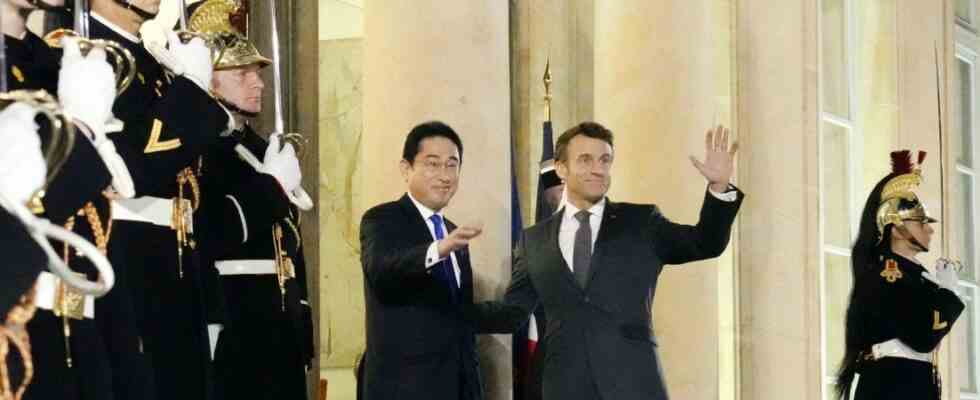The long journey began for Japan’s Prime Minister Fumio Kishida on Monday in Paris with a special honor. French President Emmanuel Macron showed him the Notre-Dame Cathedral, which is due to shine again next year after the great fire of April 2019.
According to the presidential office in Paris, it was the first time that Macron had invited a foreign head of government to the construction site. And of course this invitation had a symbolic content, especially since Japan itself is currently restoring a valuable cultural monument after a fire, namely the Shuri Castle in Okinawa. The visit was intended to represent the common desire for reconstruction in difficult times and thus also show how close Japan and France are.
Afterwards, Kishida and Macron drove to the Élysée Palace for a working lunch. They later jointly stated that strict sanctions against Russia and aid to Kyiv were still needed because of Vladimir Putin’s war in Ukraine.
Kishida urgently needs the backing of the G7
This year Japan holds the presidency of the group of the seven most important free industrial states, the G 7. That is why Prime Minister Kishida is touring through Europe and North America these days. After Monday’s visit to Paris, he met Italy’s Prime Minister Giorgia Meloni in Rome on Tuesday, before traveling to the UK, Canada and the US. It’s about the G-7 summit on 19/20. May in Hiroshima to prepare and exchange thoughts on the troubled world situation, for example on topics such as food and energy supply.
Kishida, 65, also wants to push his vision of a world free of nuclear weapons. This fits the location of the summit: Hiroshima, Kishida’s birthplace, was the first city in the world to be hit by an atomic bomb in 1945.
But that’s not the only reason why the trip is important for Kishida. Japan has just rewritten its national security strategy. It has been clear since December that the country will increase its defense budget from one to two percent of gross domestic product. The rockets that Tokyo wants to acquire for this purpose will be used in a so-called counterstrike capability. According to this, Japan can shoot at enemies when they are preparing an attack. The USA in particular welcomes this development against the background of the experiences with Russia, North Korea’s nuclear armament and China’s ambitions for power.
However, Japan still has its pacifist constitution, which prohibits the country from any aggression because of its role in World War II. Kishida therefore needs the support of the G-7 partners all the more urgently.
He got that in Paris, especially in view of China’s authoritarian government, which is making historical claims to the democratically governed Taiwan. Kishida and Macron stressed the importance of peace in the Taiwan Straits and agreed on further Japan-France military exercises in the East China Sea. In Rome and London, too, joint armaments and military projects are at stake. And at Kishida’s planned meeting with US President Joe Biden in Washington, a White House spokeswoman announced that they would “celebrate the unprecedented strength of the US-Japan alliance.”
There is a crisis in Kishida’s political environment
A tour of solidarity is therefore to be expected. And not only does the free world need it, but also Fumio Kishida himself. Because his position of power at home as prime minister and president of the governing LDP party is by no means secure. His poll numbers have not been good recently, and the domestic political situation is complicated.
The assassination of ex-prime minister and nationalist idol Shinzo Abe in July plunged the LDP into a crisis. It became known that important party members were involved with the Unification Church sect. This is one of the reasons why Kishida rebuilt his cabinet in August. That didn’t bring peace. On the contrary. Four ministers have already had to resign because of various revelations – a feast for the opposition.
The greater danger threatens Fumio Kishida but probably from his own party. Because there is a dispute over the financing of the new security strategy. Kishida is planning tax increases, but Abe’s supporters are against it and in some cases openly question their president. Sanae Takaichi, Minister of Economic Security, recently tweeted that she did not understand “the real intention” of the prime minister. There are rumors that if the LDP suffers significant losses in April’s nationwide local elections, Kishida may not be prime minister until the G-7 summit in May.
Fumio Kishida appears “confident that his party’s victories in local elections and a successful G-7 summit will help strengthen his ailing position,” the Kyodo news agency recently wrote. The Prime Minister is therefore relying on signs that make a good impression. This is another reason why the current trip is important for him. Especially the public visit to Notre-Dame.

